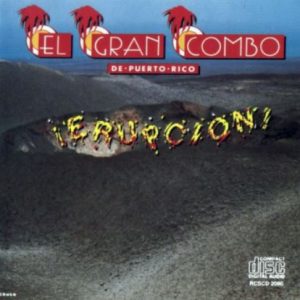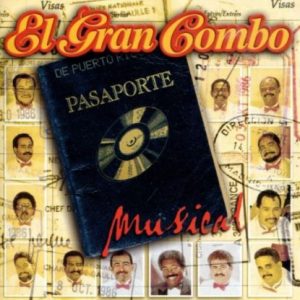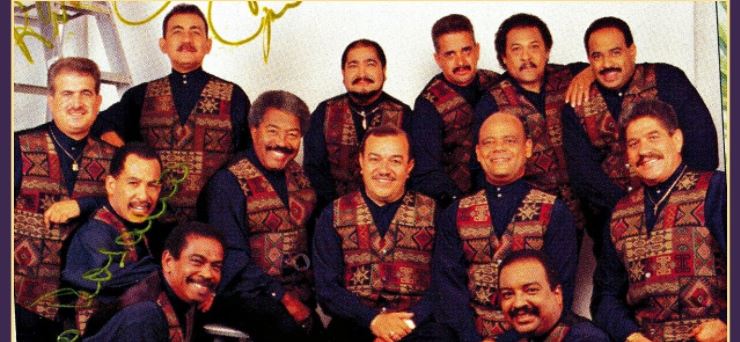This post is also available in:
 Español
Español
As the craze for Salsa Romántica grew to its climax in the 1990s, the number and impact of recordings by El Gran Combo, diminished.
However, despite their struggles with their recordings, El Gran Combo found a way to remain relevant in the Salsa scene.
El Gran Combo Struggles with Salsa Romántica
After crushing it with the mostly Salsa Romántica album “Amame“, El Gran Combo entered the 1990s with confidence. That confidence didn’t last long.
“Latin Up“, the first album of the ’90s, brought back arranger-producer Ernesto Sanchez after his startling success with “Amame“. But “Latin Up” fell way short of his predecessor. The first single of the album, “Combustible“, did ok. But the best songs were the Bomba “Me Lo Contó Tu Papá“, written by Jerry Rivas but sung by Charlie Aponte, and the romantic “Noche de Dolor“.

Rafael Ithier decided that take back the musical arrangements for their next album “Erupción“. The album had better luck than its predecessor, perhaps because of a rare non-romantic song by Omar Alfanno titled “Trinchera“. The song was a clear reference to the impact the Gulf War was having on the lives of the Puerto Rican soldiers and their families, who were deployed to the Middle East. With part of the song being made by children, the song was a super-hit that carried “Erupción“.
To celebrate their 30th anniversary, Los Mulatos del Sabor released “Gracias, 30 Años de Sabor“. Like the previous two albums, this one tried once again to make headway in the Salsa Romántica movement. However, just like its predecessors, it was the non-romantic songs that carried the album. “Gracias“, written and performed by singer Charlie Aponte, and “Los Tenis“, performed by Jerry Rivas were the top hits. And once more, the album was arranged entirely by Rafael Ithier.
The Forgettable Trilogy
The next three albums continued to focus on Salsa Romántica and were all forgettable efforts. For “First Class International“, Ithier decide to bring back Ernesto Sanchez and Louis Garcia to help with the arrangements. Sanchez did two arrangements, and Garcia did one, while Ithier did the rest. “Te Deseo” and “Pancho Fantasía” were the most played songs.
Ernesto Sanchez and Louis Garcia were back in “La Ruta del Sabor“, but doing only one arrangement each. Legendary bassist Bobby Valentin was brought in to do three arrangements of the eight songs of the album. Then in “Para Todos Los Gustos“, Ithier had Sanchez and trumpeter Tommy Villarini help with the arrangements.
Rafael Ithier’s efforts to find a formula for the band to produce the success of “Amame” in Salsa Romántica, all failed.
Slow Finish in the ’90s
El Gran Combo struggles with Salsa Romántica showed in a reduced number of recordings in the second half of the decade. El Gran Combo did six recordings in the first 5 years of the ’90s, but only two more during the other 5 years.

“Por Todo lo Alto” (1996), and “Pasaporte Musical” (1998) were the last two recordings of the ’90s. I can’t remember even hearing any of the songs in “Por Todo lo Alto“. However, I do remember a couple from “Pasaporte“. “Que Me lo Den en Vida” by Mike Amadeo, a Puerto Rican that owns a Music store in NYC, was a big hit. I really don’t like the song that much, as I find it somewhat egoistic. No disrespect is intended towards Amadeo, who seems like a humble person.
The song I like the most from “Pasaporte” is “En Sus Lenguas Quedo“, of the great Puerto Rican composer Rafi Monclova. Charlie Aponte does a great job in singing the song, and the classic Gran Combo arrangement swings with flavor.
None of the songs that had significant airplay in these two albums were Salsa Romántica. This is par with the trend for El Gran Combo in the ’90s.
Other Notes of El Gran Combo in the 90s
I don’t want to finish without touching on two things that I believe were important to mention during the ’90s.
The first one was the departure of Epifanio “Fanny” Ceballos. “La bara” of El Gran Combo apparently died of cancer. His last recording with the band was “Erupción” (1991). Fanny was with El Gran Combo for 20 years and brought the sound of the trombone to the group. He was temporarily substituted by Toñito Vazquez until Moises Nogueras was hired as his replacement that same year.
Here’s a great video from 1992, shortly after Fany passed as El Gran Combo started celebrating their 30th anniversary. It’s an 80’s song, but they did it as a small tribute to Fany, as Charlie and Ithier say in the introduction.
The other was the leading role of Freddie Miranda as co-producer of El Gran Combo albums. Freddie began helping Rafael Ithier with the production of the albums back in the ’80s, but perhaps took a more prominent role in the ’90s.
Looking into a New Millennium
The struggles of El Gran Combo in the 1990s are hard to explain. Ithier and the rest of the combo did all they could to ride the wave of Salsa Romántica. The success in this genre was evasive to them. Ithier tried new arrangers, new producers, new composers, and back to his original arrangements, but nothing seemed to work.
The public preferred the non-romantic songs El Gran Combo recorded, with very few exceptions. The band was built to swing, and its followers didn’t seem to want the new romantic themes.
However, with all its struggles, El Gran Combo remained relevant. The many hits they had accumulated through the decades, particularly in the ’80s with Charlie, Jerry, and Papo, along with the one or two hits per album in the ’90s, resulted in sold-out live presentations. With an agenda booked years in advance, El Gran Combo remained busy and relevant. As a result, their travel itinerary intensified as they would have to rely on the public of South America and the diaspora in cities of North America to fill their calendar.
In the new millennium, they faced the dilemma of either continuing with their current approach or going back to the heavier Salsa of the ’70s and ’80s.
Follow us to our next chapter (the 2000s) to learn more about the History of El Gran Combo.


[…] Salsa Romántica was a malady that affected the Salseros of Ismael’s old-school generation. El Gran Combo released several albums on this style of salsa, with only a handful of memorable songs. Andy […]